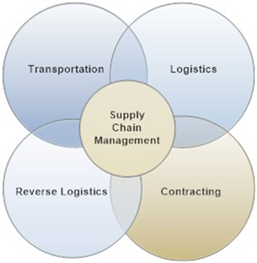By Dr. Robert Gordon, CPC | 10/05/2023
 The global successes of large retail firms that focus on supply chain management (SCM) have shown the importance of learning this subject in collegiate schools for supply chain management majors. Also, the increase in home deliveries brought about by the COVID-19 pandemic has increased the need for skilled supply chain managers in an organization, as more companies understand why they should have employees with SCM skills in-house.
The global successes of large retail firms that focus on supply chain management (SCM) have shown the importance of learning this subject in collegiate schools for supply chain management majors. Also, the increase in home deliveries brought about by the COVID-19 pandemic has increased the need for skilled supply chain managers in an organization, as more companies understand why they should have employees with SCM skills in-house.
As a result of changes in consumer requirements, supply chain management has emerged as a vital organizational function in modern businesses. It involves coordinating all aspects of the supply chain, such as:
- Initial design
- The procurement of raw materials
- Production
- Distribution
- Consumption
As a result, a supply chain manager must have a diverse set of skills and a structured educational background to work this field.
Some people move up in this field with just experience; however, there is more value in the current market for someone with a management degree or a university degree accompanied by skills acquired through practical experience. A degree can certainly distinguish you in the marketplace, so it would be recommended to anyone interested in a job in the supply chain field to pursue a bachelor’s or master’s program.
Although many people see a degree in SCM as the only option in the field, many other related degrees can still be valuable in today's market.
This infographic shows the various academic options for the study of SCM. A supply chain management program can involve studying transportation, logistics, reverse logistics, retail management, and contracting.

Image created by author.
Undergraduate Degrees in Supply Chain Management
The most direct path to this field is obtaining a bachelor of science degree. A bachelor’s degree in SCM typically offers courses in logistics, operations management, inventory management, procurement, and transportation.
These courses help students to understand the principles of managing a supply chain, the logistics involved in transporting goods, and the strategies to effectively manage inventories. In addition, most higher education degree programs require a capstone project to demonstrate your mastery of academic material.
For instance, good supply chain managers understand that inventory is a static asset that is better used elsewhere. Inventory is basically money sitting in a warehouse, so SCM professionals need to streamline inventories so that products move in and out of storage, rather than sitting in place for an extended period.
Additionally, supply chain management programs typically delve into concepts such as procurement, logistics software, and supplier relationships, helping to make graduates well-rounded candidates for entry-level positions in supply chain management.
A supply chain management degree is not the only route to get started in this field, however. Other related undergraduate degrees include transportation and logistics, reverse logistics, and contracting.
These related degrees can provide students with the chance for further specialization in key areas of SCM. These related degrees offer similar courses to traditional supply chain management; however, they focus primarily on a specialty area.
However, do not despair because if none of those related fields are of interest to you. You can also look into undergraduate business programs, management, industrial engineering, and economics.
These types of degrees equip students with a solid business foundation as well as analytical and problem- solving skills, which are critical in supply chain roles. These related degrees can also help you segue into the field.
What Will I Learn in a Supply Chain Management Program?
A supply chain management degree generally includes:
- Foundational business concepts
- Logistics and transportation management principles
- Operation management
- Procurement
- Risk management
- Data analytics
- Management
- Ethics
These areas typically form the nucleus of a supply chain management degree, and you can expect to learn more about them through your program. You may also learn the concepts of supply chain management, including its importance, the critical components of a supply chain, and the various stages from procurement to distribution.
Logistics and Transportation Management
Logistics and transportation management focuses on the practical aspects of warehouse management, transportation, distribution, warehousing, and inventory control. Students taking courses in this area will explore strategies to optimize the movement of goods while they minimize costs and maximize efficiency.
Logistics and transportation management also involves different modalities of freight, so that supply chain management students will understand when to use ground, air, and ocean freight transportation companies to transport goods and raw materials for manufacturing. At the same time, this area also encompasses products in the last-mile movement to consumers.
Operations Management
Operations management covers the processes that transform inputs into outputs, emphasizing efficiency and quality control. For example, this area includes manufacturing, where raw materials are processed with other materials to create finished products for the market.
Supply chain management students may study production planning, scheduling, quality management, and lean principles. In addition, as the world has become increasingly interconnected, students will learn about conflicts involved in managing a supply chain across international borders, such as cultural differences, regulatory challenges, and global logistics optimization.
In addition, students will study decision-making processes to align supply chain management and a supply chain strategy with business goals. Required courses in this area might include network design, demand-supply matching, and strategies for continuous improvement.
Procurement
Procurement relates to sourcing raw materials and goods from suppliers, negotiation techniques, supplier relationship management, and strategies for reducing costs while maintaining quality. In this area, supply chain management students learn about the bidding process as well as how to take competitive advantage and manage risk in purchasing.
Students will also be exposed to different types of contracts and will learn to understand when to use various contract types. In addition to understanding procurement, students in this type of degree will study methods to accurately predict consumer demand, which aids in managing inventory and avoiding stockouts or overstock situations.
Risk Management
In risk management, students study strategies for identifying, mitigating, and managing the risks within supply chains, ensuring continuity despite disruptions such as natural disasters or geopolitical events. Risk management students also need to understand different coping strategies to manage risk and the need for multiple suppliers for a single product or service.
In addition, they need to understand the usefulness of standby agreements that might be necessary to mitigate more significant organizational risks. For example, there may be disruptions due to environmental factors such as adverse weather, labor strikes, labor shortages, or pandemics.
Data Analytics
Data analytics introduces students to the use of tools and technologies to make informed decisions within various supply chain management programs. Topics in this area may include data-driven insights, predictive modeling, and software tools.
Understanding data analytics also aids students’ understanding of the importance of collecting and analyzing data related to all of the elements impacting a supply chain. Data is crucial to a supply chain management student as it allows the identification of patterns to utilize contracts and transportation more efficiently.
Ethics
Given that supply chain managers are involved with legal contracts, supply chain managers need to understand the laws and codes of conduct that guide supply chain professionals. As sustainability becomes a critical concern, ethics will encompass:
- Ethical behavior considerations
- Environmental impacts
- Labor statistics
- Strategies for creating sustainable and socially responsible supply chains
Furthermore, as the supply chain manager is acting as an organization's agent, the organization's goals must be kept at the forefront rather than an individual’s personal goals.
A Broad Knowledge Base Is Critical in Supply Chain Management
A bachelor's program in SCM is typically designed to equip students with practical skills and an understanding of the multifaceted world of supply chains. A SCM degree offers students a broad knowledge base about different strategies and methods of procurement and moving goods and services.
Through a curriculum encompassing various business disciplines, analytical skills, and practical insights, graduates can prepare for roles related to transportation, logistics, procurement, and supply chain management. As global supply chain management continues to evolve, the knowledge gained from a supply chain management degree becomes increasingly useful in ensuring the efficient and effective movement of goods and services across the interconnected landscape of modern business.
Graduate Degrees in Supply Chain Management
For those students who are interested in further deepening their knowledge of the field, a master or bachelor's degree – such as an MBA with a concentration in supply chain management or a master's in SCM – could be an excellent choice. These advanced degrees give students a more in-depth understanding of supply chain operations, supply chain logistics, and other concepts and strategies, making them ideal preparation for higher-level positions and specialized roles.
For instance, an MBA in SCM combines a comprehensive business education with a specialized focus on supply chain functions. It goes beyond the fundamental principles learned in business schools and undergraduate studies to incorporate aspects of global SCM, strategic decision-making, and leadership.
On the other hand, a master's in supply chain management, sometimes known as a master's in logistics and SCM, delves deeper into specific areas. These areas may include global and supply management, chain design, risk management, and advanced analytics.
This type of degree can offer opportunities to prepare for higher-level strategic roles and consultancy positions in the industry. A master's in SCM can also help students to develop the skills for becoming industry leaders within organizations.
SCM Is a Complex and Dynamic Field
The SCM field is complex and dynamic with various career paths, according to the Association for Supply Chain Management. Whether you’re pursuing an undergraduate degree or deepening your understanding with a graduate degree, education will be vital in understanding this field.
Professional certifications can also supplement your learning. Supply chain professionals should consider joining an organization like the Institute of Supply Management to be involved with like-minded individuals and network with professionals in the field.
Ultimately, earning a supply chain management degree can lead to professional fulfillment. However, professional satisfaction will always depend on your professional goals, interests, and the specific requirements of a full-time job.
American Public University's Online Programs in Transportation and Logistics Management
American Public University offers several bachelor- and master-level programs for aspiring SCM professionals. These programs include:
- B.S. in Accounting
- B.A. in Business
- B.A. in Management
- B.A. in Reverse Logistics Management
- B.A. in Supply Chain Management
- B.A. in Transportation and Logistics Management
- M.S. in Accounting
- MBA in Business Administration
- M.A. in Reverse Logistics Management
- M.A. in Supply Chain Management
- M.A. in Transportation and Logistics Management
At the University, our expert faculty will guide you through real-world scenarios, equipping you with the knowledge and skills needed for this ever-changing industry. You will also have access to a supportive community of like-minded students. APU's flexible online courses enable you tailor your studies to fit your busy schedule while still receiving a quality education in supply chain management.
Relevant Articles: